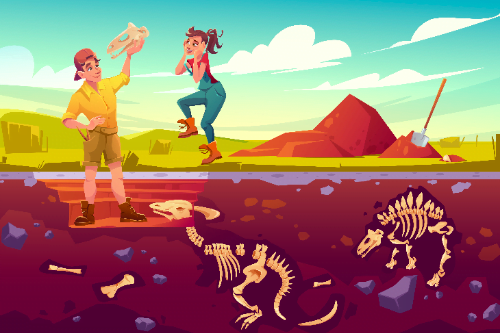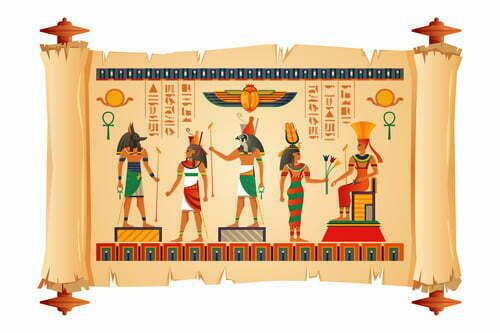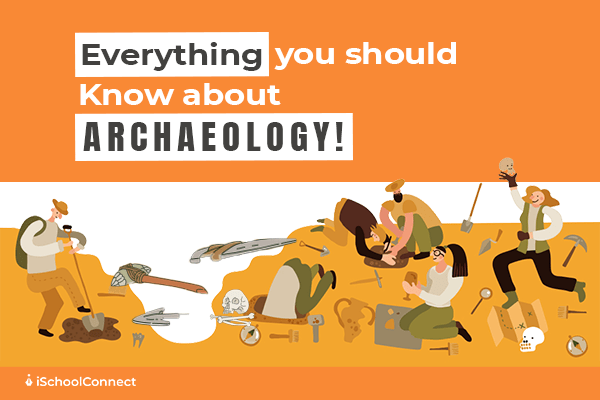Table of Contents
Archaeology is the study of past cultures. Archaeologists study how people who walked the Earth before us, lived, worked, and participated in society. They also study their movement patterns, what were their beliefs, and basically any other aspect that can shed light on what life was like in the past. Here is a complete guide on everything you need to know about pursuing an archaeology course and becoming an archaeologist.
What is Archaeology?
Archaeology is the study of human activity during ancient times by discovering, recovering, and analyzing remains. Additionally, it gives us an overview of the social and cultural aspects of the past. It also allows us to understand our present society and cultures.
What do archaeologists do?
Archaeologists study things of the past that were created, used, or altered by humans. Some of the archaeological sources are lithic tools, monuments, inscriptions, buildings, pottery, seals, coins, gems, jewelry, skeleton, metal pieces, and different other antiques. Archaeologists also study contemporary societies to better understand
the past. Subsequently, archaeologists have to work with people from a wide variety of other disciplines, who help them find answers about who we are and where we came from. Just like archaeology involves the study of the past and present, it can also tell what our future may bring. Moreover, they may perform some general fieldwork and have lab skills; they may also develop specific expertise that allows them to study certain types of artifacts or sites. While some archaeologists develop language skills to record and translate ancient texts and scripts, found at archaeological sites, some specialize in the study of human remains.
What are the different branches of study in Archaeology?

Let us discuss some of the most prominent types of archaeology. You must know the following if you plan to pursue a career in archaeology-
1. Historic Archaeology – This is the study of ancient artifacts, it includes items that we use in everyday life such as utensils, pottery, jewelry, musical instruments, medical equipment, etc.
2. Maritime Archaeology – This branch of study includes the discovery of a lost city, wrecked ships, submarines, cargos, and more. It discovers the interaction of ancient humans with the ocean, lakes, river systems, marine life.
3. Urban Archaeology – This branch of study deals with understanding the plans and maps of historical cities. It is the study of ancient architecture and structural facets of great cities such as Mohenjo-Daro and Harappa.
4. Environmental Archaeology – In this branch, archaeologists investigate and document how societies interacted and modified their environment in the past. Environmental archaeologists gather and provide information that helps us make measured decisions about our environment in the present and the future.
5. Museology – Archaeology is not only about discovering and analyzing, it also deals with organization, preservation, and restoration. This branch of archaeology is important because it teaches us about evolution, gives meaning to our existence, and paves a path for future generations to understand society and its history.
Skills required for an archaeologist

1. Critical-thinking- Archaeologists do the kind of work that involves numerous observations and research methods. They also carry out laboratory experiments and the power of critical thinking is needed to conclude these studies.
2. Analytical skills– Archaeologists need this skill to conduct extensive historical research including data and other scientific methods. They must have a strong understanding and application of mathematics and statistical concepts.
3. Writing skills– Archaeologists must be able to write reports based on their discoveries. It is an important part of any archaeological findings to note down the details and these writings may also be published in public interest forums and scholarly journals.
4. Investigative skills– It is a given that archaeologists must have sound investigative skills. They explore and discover numerous facts as a part of their job and the ability to spot minute pieces of information makes someone a good
archaeologist.
5. Teaching skills– If you become an academic archaeologist, you will have to teach at a college or university. This skill can help you connect and communicate with different types of students. You can explain your studies and research better and this skill helps you to perform effectively in the educational field.
6. Photography skills– As an archaeologist, this is an important skill to have. You should be able to click photographs while you are investigating. This ensures that you will never overlook even the most minute detail. You should be able to capture different types of photographs, landscapes, art, that help you to find archaeological evidence and study further.
What subjects are taught in Archaeology?

Students who are interested in studying Archaeology must be prepared to study these common subjects as part of the archaeological courses-
- Introduction to Archaeology
- Science in Archaeology
- Methods in Archaeology
- Field Archaeology
- History
- Iconography
What’s Next?
As technology develops, new methods for studying have come up. For example, Google is available to produce high-resolution images, this makes the job easier for archaeologists. Where archaeology will be in the future depends on the advancement of technology and where humans will go from here. Archaeologists shortly will increasingly work with astronomers, physicists, biologists, and other scientists, to search for the remains of non-human civilizations.
Key Takeaways
- The skills you will learn while studying Archaeology can be applied to a variety of career choices.
- You will also gain analytical skills, reasoning skills, practical skills, the ability to work within or as the leader of a team, and so much more.
- Archaeology as a career choice is gaining demand and it is a prolific field of study that promises to offer you endless opportunities.
We hope you enjoyed reading this blog. In case of any queries or questions regarding this course, drop a comment below or reach out to us!
Liked this Blog? Read more: Learn about the hardest degree in Guinness World Record!
FAQs
Q1. What is the difference between an archaeologist and an anthropologist?
Answer- Anthropologists primarily study the evolution of humans, societies, and civilizations from the past to the present. Whereas, archaeologists study the past through objects, artifacts, and remains left by humans. They also assist in excavating and preserving them.
Q2. What are some of the career opportunities for an archaeologist?
Answer- Students can work with the country’s department of archaeology. In addition, they can take up the teaching profession in colleges and universities, and can even work in private as well as public museums, for preserving and safekeeping of historical artifacts.
Q3. Who is known as the father of Indian Archeology?
Answer- Alexander Cunnigham, the first Director-General of the Archaeological Survey of India is called the father of Indian Archaeology.
Q4. What are some of the best archaeology books?
Answer- Some of the best archaeology books are-
- Come, Tell Me How You Live by Agatha Christie
- Progress and Archaeology by Vere Gordon Childe
- Method and Theory in American Archaeology by Gordon R. Willey, Philip Phillips.






